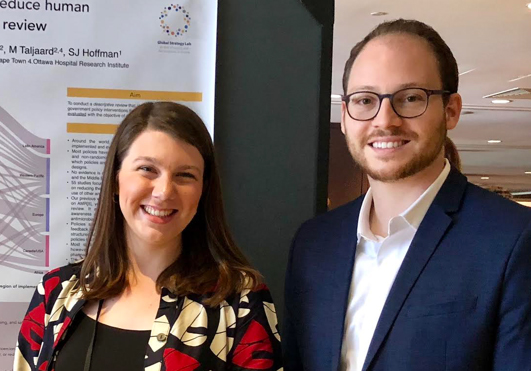
While recent health-care attention remains on the "triple threat" of COVID-19, influenza and respiratory syncytial virus, we cannot overlook the emerging pandemic of antimicrobial resistance – an already critical problem with the potential to become so dire that a small cut could lead to death, as without reliable antibiotics, some infections could be untreatable, say researchers from the York University-based Global Strategy Lab (GSL).
Creating solutions to antimicrobial resistance (AMR) will be made possible with a unique project initiated by York’s GSL and an $8.7-million grant from Wellcome Trust, a global charitable foundation that supports science to solve urgent health challenges.
Antimicrobial drugs are increasingly falling short in their ability to tackle infectious bugs due to overuse, and this has only intensified since COVID-19 began. It has gotten to the point where we might see basic health-care standards compromised within a generation, GSL experts say. The AMR Policy Accelerator, an ambitious initiative by GSL, will act as a critical antidote to this global threat by intersecting scientific research and evidence-based policy to urge governments to act.

“It's not one bug and one drug that we're worried about – it's the whole ecosystem,” says GSL’s Susan Rogers Van Katwyk, a leading epidemiologist who acts as managing director of the new project. “People around the world, and Canadians in particular, expect when they go to the doctor’s office that there's going to be a drug that's going to be able to treat their infection. We're increasingly looking at a situation where that won’t be possible unless we change course.”
The accelerator is not a typical research project. While some of its output will be academic papers, it will also provide customized research and advisory services to governments and civil-society organizations – especially in low and middle-income countries – in response to requests for evidence on AMR policy, implementation and evaluation.
"The AMR Policy Accelerator will leverage the Global Strategy Lab’s proven track record of using evidence to advise the world’s governments. These much needed research-based solutions for policymakers will result in more equitable and effective AMR policies and action plans worldwide,” says GSL Director Steven J. Hoffman, who is also a professor at York University’s Faculty of Health and Osgoode Hall Law School.
The initiative is led by Hoffman and Rogers Van Katwyk, with support from York researchers Mathieu Poirier, Adrian Viens and Tarra Penney and University of Ottawa’s Patrick Fafard. Wellcome supports discovery research into life, health and well-being, and works to take on mental health, infectious disease and climate and health, pledging to spend £16 billion over the next 10 years. The GSL team will look at AMR from its three main points of spread and how these intersect: human, animal and environmental. They will work with governments to not only give them the best research information, but also tailor solutions for local challenges, a message they are emphasizing this World Antimicrobial Awareness Week and will tackle in more detail during a panel discussion on equity and AMR happening this Thursday.
“We know that what works in a high-income country like Canada isn't necessarily going to be what works in a low-income country that struggles to get clean water in their rural hospitals,” says Rogers Van Katwyk.
The researchers say because of AMR, longer hospital stays, drug-resistant strains of pneumonia, tuberculosis and staph, untreatable gonorrhea, and infections leading to amputations are already a reality. In the next 20 to 30 years, the situation could become dire. Women would be at high risk for deadly infections when giving birth via c-section, because without reliable antibiotics, the risk of surgery leading to serious infection would be too great.
While some experts have flagged AMR as the next potential pandemic, the researchers say it could already be described as one.
“We already know it's spreading rapidly around the world,” Rogers Van Katwyk says.
Global data from 2019 showed more than a million deaths a year directly related to AMR. The COVID-19 pandemic seems to have accelerated this process, with research from the Centers for Disease Control and Prevention showing a 15 per cent increase in both AMR resistance and AMR-related deaths in U.S. patients hospitalized with COVID-19 in the first year of the pandemic.
“With COVID-19, with that many people in hospital – intubated and experiencing secondary bacterial infections – that’s created massive opportunities for more antimicrobial resistance to develop,” Hoffman says. “If decision-makers don’t implement sound policy based on evidence, we may be facing the next crisis without these vital treatments.”
While overreliance in medical settings is a major source of AMR, it is not the only one. Animals receive the same antibiotics humans do, and while some use is responding to infectious disease, a lot is done pre-emptively or as a growth promoter, especially with livestock in industrialized food settings, the researchers say. Resistance can then develop in the animals themselves and in the environment through waste.
Governments need to tackle all of these sources and how they interact.
“We can't bring antibiotic use down to zero, but we can bring it down to a sustainable level where we conserve the drugs’ effectiveness,” Rogers Van Katwyk says. “So we can keep using antibiotics now and in the future for our kids, and we don’t lose what is ultimately an incredibly precious resource.”
To register and submit questions to global experts as part of the Importance of Equity in AMR Policy Making panel happening Thursday, Nov. 24 at 10 a.m. EST/3 p.m. GMT, click here.
